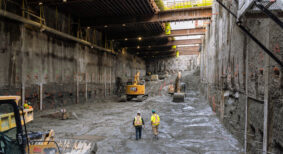When it comes to mental health issues in the construction industry, the ongoing COVID-19 pandemic is raising concerns and emphasizing the importance of having strategies in place to provide support.
The high level of uncertainty and stress created by the crisis can lead to anxiety, substance use and depression. There is a real need to transition workplace cultures in meaningful ways to allow for open conversations about mental health. COVID-19 has brought mental health, along with other safety issues, to the forefront like never before.
With construction deemed an essential service early in the pandemic, companies had to react quickly to implement new public health measures to continue working.
“One of the advantages we had as a construction industry is we do have a lot of health and safety protocols in place already that are required,” said Darin Hughes, president of Scott Construction. “For us, it was really about understanding what we needed to do immediately to ensure that our workers are safe.”
Hughes was one of several industry experts that met for a virtual summit to discuss mental health strategies as part of the BC Municipal Safety Association’s free psychological support toolkit, developed to provide workers with resources to cope during the pandemic.
For the construction industry, collaboration and sharing protocols was key to getting through the initial stage of the pandemic, said Hughes, and then through the summer, it almost felt normal.
“Now we’re at this stage where we’re starting to see the long-term effects of being in this state of hyper attention to COVID,” he continued. “What we’re seeing now is… people definitely having anxiety, seeing some absentee issues and we are also seeing a general irritation on a day-today basis.”
Hughes explained it’s important to allow mental health to be an approachable subject and deliver the information easily and in “digestible size” content to those who need it.
Moving forward, he said it’s important to watch workers closely, identify what are the signs and provide the right support. Scott Construction’s mental health committee has focused on making information as easy to access and as frequently available as possible.
“The key for us is to make sure they know what supports are out there. We’re not going to solve the issues around mental health necessarily but we’re able to direct them and guide them. From our standpoint, that’s what we’re trying to do,” he said. “But we can do a lot better to continue to make the information available.”
Scott Construction created a mental health committee several years ago to assist workers who need help with their mental health and wellness. The volunteer committee assists and teaches what to notice, what to do, and how to be proactive with someone struggling with mental illness.
COVID has also made substance abuse, already a challenging problem, worse in the industry. Hughes explained that construction work is very physical that can cause repetitive strains and injuries, driving workers to seek relief with alcohol or other substances.
“This is a very hard subject to talk about. When you look at the numbers and how they relate to our industry specifically – it’s daunting,” he said. “We’re a male dominated industry and the way males typically deal with mental health is through substance abuse.”
Although there is more awareness about mental health, the biggest barrier to mental illness assistance is the stigma that still exists. COVID has put a greater focus on mental health and substance abuse, which Hughes feels will be the upside that comes out of this.
“I think putting the spotlight on these issues for the construction industry is needed,” he said. ““There will be a much greater focus on it going forward – how do we provide the resources to the people who need it and how do we identify it. We have a lot more awareness in our industry and I’m excited about where we can take that.”
Cheryl Mah is managing editor of Construction Business.









